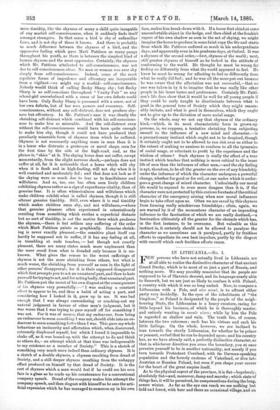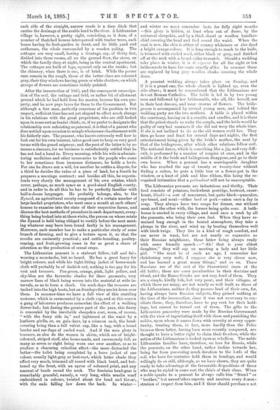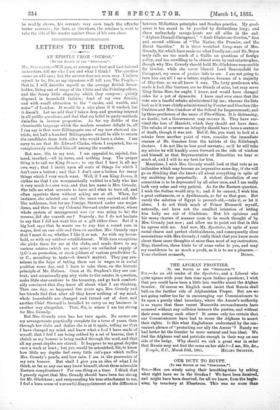IN LITHUANIA.—No. I. IN LITHUANIA.—No. I.
FEW persons who have not actually lived in Lithuania are at all able to realise the distinctive character of that ancient Grand Duchy, which is to most of us just a part of Russia, and nothing more. We may possibly remember that its people are supposed to be of Slavonic descent, and its language nearly akin to Sanscrit, but we are just as likely to confuse it with Poland, a country with which it was so long united. Now, to compare a Lithuanian with a Pole, and vice versa, is to affront either party very decidedly. In the eyes of the inhabitants of "the kingdom," as Poland is designated by the people of the neighbouring State, the Lithuanian is a heavy' creature, caring for little beyond his business, of which he is thoroughly master, and entirely wanting in savoir vivre; while by him the Pole is regarded as shallow and vain. The truth lies, of course, between the two extremes ; each has his virtues and each his little failings. On the whole, however, we are inclined to lean towards the sturdy Lithuanian, for whether he be prince or peasant, we feel that he can be depended upon; and his country has, as we have already said, a perfectly distinctive character, so that in whichever direction you cross the boundary, you at once perceive yourself to be in another nationality, not merely if you turn towards Protestant Courland, with its German-speaking population and the homely customs of Vaterland, or dive into Austrian or Russian Poland, but even if you shape your coarse for the heart of the great empire itself.
As to the physical aspect of the province, it is flat—hopelessly, absolutely flat—and, moreover, damp and marshy ; which state of things has, it will be perceived, its compensations during the long, severe winter. As far as the eye can reach we see nothing but field and forest, with here and there an occasional village, and on each side of the straight, narrow roads is a deep ditch that carries the drainage of the arable land to the river. A Lithuanian village is, however, a pretty sight, consisting, as it does, of a number of thatched houses interspersed with timber trees, each house having its fruit-garden in front, and its little yard and outhouses, the whole surrounded by a wooden paling. The cottages are very small, having a frontage, say, of thirty feet, divided into three rooms, all on the ground floor, the stove, on which the family sleep at night, being in the central apartment. The cottages are built of logs, squared only on the inside; but the chimney, when there is one, is of brick. While the poorer ones remain in the rough, those of the better class are coloured grey, their tiny windows having green or white shutters, on which groups of flowers are sometimes rudely painted.
After the insurrection of 1863, and the consequent emancipation of the serf, the cottage and field, or rather bit of allotment ground which he had held from his master, became his own property, and he now pays taxes for them to the Government. But although a free man, perfectly conscious of his position in this respect, sufficient time has not yet elapsed to effect much change in his relations with the great proprietors, who are still looked upon in some sort as feudal chiefs, or, if we prefer to designate the relationship now subsisting as paternal, it is that of a parent who does not fail upon occasion to mingle wholesome chastisement with his fatherly care. The peasant, who knows extremely well how to look out for his own interest, takes good care to keep on very good terms with the grand seigneur; and the post of the latter is by no means a sinecure, for no business is satisfactorily settled that he has not had a hand in. Every morning, while his wife is administering medicines and other necessaries to the people who come to her sometimes from immense distances, he holds a levee. For one he draws out a will, for another he settles a dispute, for a third he decides the value of a piece of land, for a fourth he prepares a marriage contract; and besides all this, he superintends very closely the management of his own estates, which cover, perhaps, as much space as a good-sized English county, and in order to do all this he has to be perfectly familiar with half-a-dozen languages. He probably belongs, also, to the Zyaszd, an agricultural society composed of a certain number of large landed proprietors, who meet once a month at each others' houses to examine into the state of their respective farms, and discuss the best methods of procedure in each department, everything being looked into at these visits, the person on whose estate the Zyaszd is held being obliged to rectify before the next meeting whatever may have been found faulty in his management. Moreover, each member has to make a particular study of some branch of farming, and to give a lecture upon it, so that the results are eminently practical ; and cattle-breeding, poultryrearing, and fruit-growing come in for as great a share of attention as the production of cereal crops.
The Lithuanian peasant is a stalwart fellow, tall and fair, wearing a moustache, but no beard. He has a great fancy for bright colours, and while his tight-fitting jacket of home-made cloth will probably be of darkish red, nothing is too gay for his vest and trousers. Pea-green, orange, pink, light yellow, and sky-blue are the favourite shades for these garments, very narrow lines of black being woven into the material at wide intervals, so as to form a check. On week-days the trousers are tucked into the high boots, but on Sundays they are let down over them. In summer-time we have a full view of this startling costume, which is surmounted by a cloth alp, and at this season a gang of labourers produces somewhat the effect of a walking flower-bed; but during the greater part of the year, this finery is concealed by the inevitable sheepskin coat, worn, of course, " with the furry side in," and tightened at the waist by a leathern girdle, or, on gala days, by a crimson sash, the headcovering being then a full velvet cap, like a bag, with a broad border and ear-flaps of curled wool. And if the men glory in trousers, so also do the women in skirts, which are of brightcoloured, striped stuff, also home-made, and enormously full, as many as seven or eight being worn one over another, so as to produce a charming crinoline effect—the more distended the better—the toilet being completed by a loose jacket of one colour, usually light-grey or beet-root, which latter shade they affect very much, trimmed all round with black braid, and but; toned up the front, with an apron of coloured print, and any amount of beads round the neck. The feminine head-gear is remarkably graceful, namely, a very long, white muslin scarf embroidered in colours, twisted about the head and throat, with the ends falling low down the back. In winter— and winter we must remember lasts for fully eight months —this glory is hidden, at least when out of doors, by the universal sheepskin, and by a thick shawl or woollen handkerchief covering the head and tied round the waist. When the coat is new, the skin is either of creamy whiteness or else dyed a bright orange-colour. It is long enough to reach to the heels, is trimmed with curled wool, either black or grey, and finished off at the neck with a broad collar to match. Should a wedding take place in winter, it is tie r;gueur for all the eight or ten bridesmaids to have fur coats exactly alike. In summer these are replaced by long grey woollen cloaks covering the whole dress.
A peasant wedding always takes place on Sunday, and if it is a grand one, the whole church is lighted up, even the side altars ; it must be remembered that the Lithuanians aro devout Roman Catholics. The bride is led in by two young men and followed by her bridesmaids, who all, like herself, are in their best dresses, and wear crowns of flowers. The bridegroom is accompanied by several young men, and behind the wedding party are the two mothers. A table is placed within the sanctuary, having on it a crucifix and candles, and it is there that the priest stands to unite the couple, and the bride would be guilty of very bad manners if she did not weep the whole time. If she is not inclined to do so the old women scold her. They then go home and feast for several days and nights, the first entertainment being given by the bride's mother, the next by that of the bridegroom, after which other relations follow suit. The national dance, which is something like a jig, and very difficult, is performed by a number of couples at once, and in the middle of it the bride and bridegroom disappear, and go to their own house. When a peasant has a marriageable daughter who has reached the age of twenty or twenty-four without finding a suitor, he puts a little tree or a flower-pot in the window, or a knot of pink and blue ribbon, this being the recognised intimation that a pretendant will not be unacceptable.
The Lithuanian peasants are industrious and thrifty. Their food consists of potatoes, buckwheat porridge, beetroot, sauerkraut, kluski—a sort of maccaroni, but quite black—pancakes, rye-bread, and meat—either beef or pork—eaten once a day in soup. They always have two soups for dinner, one without meat and the other with, the former being quite soar. A bathhouse is erected in every village, and used once a week by all the peasants, who bring their own fuel. When they have remained long enough in the heated atmosphere, they .take a plunge in the river, and wind up by beating themselves well with birch twigs. They live in a kind of rough comfort, and are never in want, but are not nearly so expansive as their Russian neighbours, these latter being always ready with some friendly speech :—" Ah ! that is your eldest daughter," they will say on meeting a lady and her little girl. " She must be of such an ago, I remember her christening very well ; I suppose she is very clever now, and has learned a great many things," and so on. These Russians are of the sect of the Starowierzi (men of the old faith); there are some peculiarities in their doctrine and ritual, and the Russo•Greeks are not very fond of them. They are a simple, kindly folk, but very poor; and their villages, of which there are many, are not nearly so well built as those of the Lithuanians, neither do they possess land of their own, for, having always been Russian subjects, they gained nothing at the time of the insurrection, since it was not necessary to conciliate them ; they, therefore, have to pay rent for their holdings, but cannot be turned out of them. The gifts to the Lithuanian peasantry were made by the Russian Government with the view of ingratiating itself with them and punishing the nobles, upon whom it comes down with severity at every opportunity, treating them, in fact, more hardly than the Poles because these latter, having been more recently conquered, are thought to have a better right to claim their freedom, while the action of the Lithuanians is looked upon as rebellion. The noble Lithuanian families have, therefore, no love for Russia, while the peasants, on the other hand, rather incline towards her, being far from possessing much devotion to the lords of the soil, who have for centuries held them in bondage, and would willingly do so still, although, as we have shown, they are quite ready to take advantage of the favourable dispositions of those who may be styled in some sort the chiefs of their clans. When a noble speaks to a peasant he al.vays calls him " friend " or "brother," but nevertheless expects and receives every demonstration of respect from him, and if these should perchance not
be readily shown, his servants very soon teach the offender better manners ; for here, as elsewhere, the retainer is wont to take the side of his master against those of his own class.




































 Previous page
Previous page